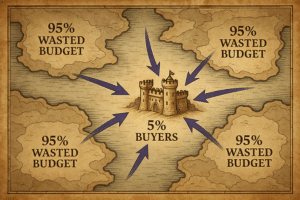Running a company is not always easy… And I have learned a lot from my experiences: it took me a long time to question myself, to question my preconceived ideas about marketing and sales, to review my methods. And I am proud today to be able to help all business leaders to evolve faster than I did on this path.
Being the head of an SME or ETI means having three pieces of good news and three pieces of trouble a day
It’s waking up sometimes with fear in your stomach, wondering if you’re going to have to take drastic measures to save the company because you didn’t manage to get that contract. It’s howling at the moon at these administrative procedures, each one more painful than the last. It’s being overcome with despair when a young employee that you spent a year training comes to resign saying “he has nothing more to learn”.
Fortunately all is not black… far from it.
But it is also the joy of mastering one’s destiny, of telling oneself that one has succeeded in creating something from nothing, of being proud of one’s product or services, of being able to pass on and of having the joy of noticing that sometimes your team surprises you by doing something unexpected and which you would not have thought of, and that together, one can reach heights impossible to reach alone.
The biggest stress: the regularity of my turnover
I don’t know about you, but my biggest stress in the nearly 20 years I’ve been running a small business has long been the fundamental uncertainty around sales. At the end of the year, looking back, I was relatively satisfied to have been able to continue to develop my turnover… But looking back, I remember the evenings spent answering invitations to tender, negotiating with the purchasing departments of major accounts, convincing such and such a customer, taking time out of my vacations to finalize the discussion with the operational staff. In short, it was a tour de force for a long time, where I had the feeling :
- That I should never let go of my attention for a single second, at the risk of irreparably dropping out.
- That no one else could do what I was doing. My business is service delivery and I put my personal credibility on every project. My sales people can help with the preliminary discussions, but when it comes to getting into the pre-sales, designing the solution and the proposal, they turn to me.
- That I was lucky to be selling services that I believed in and was proud of. It’s hard enough when you believe in it, I can’t imagine how to do it when you have to sell something you don’t believe in.
After ten years at this infernal pace, I told myself that it was not possible to continue like this.
“A good product or service should be able to sell itself…” Wrong!
I realized that something that my engineering school had instilled in me (thanks to Arts et Métiers!) was branded deep inside:
“A good product or a good service must be able to sell itself.”
Indeed, I’m going to say it a bit bluntly, but I didn’t “believe” in salespeople and even less in marketing. I thought that:
- Sales people don’t understand anything about what they are selling (in service), they are just a waste of time, when they are not there to lie to the prospect.
- Marketing is there to embellish poor quality products and services.
I think that even today, many engineers fresh out of school think that.
Dare to question yourself
How did I make my conversion to marketing automation and become a marketing advocate? With a lot of soul-searching and a good dose of humility. I discovered a little later that my preconceptions were as wrong as thinking that nuclear physics is bad because it led to the H-bomb. This is the eternal debate about the usefulness of science and its “supervision”.
“Science without conscience is the ruin of the soul
Rabelais’ credo is also mine. I started by doing more and more business, and I made a business like the services I was selling: quality.
A business :
- where we don’t lie to the customer ;
- where I prefer to give free advice than to sell a day’s work;
- where I don’t sell what I can’t do.
And if you put in place the right indicators, the right values and the right compensation, you can also have sales people who do the same thing.
Techniques to focus on efficiency
By dint of doing business, I have come to understand my prospects and clients very well, their expectations, and the different phases they go through before buying services from me. I saw that some of them were repeated with a strange constancy, and that even if personalization is the key, some answers were always the same (“How does a CRM project go?”). To save time, I started writing down those answers. And that allowed me to treat my prospects with the same quality, but much faster… and reach many more. And without knowing it, like Mr. Jourdain (yes Molière, remember?), I was marketing:
- I mapped my targets (we would call them “buyer personas” today);
- I identified their intellectual path, their doubts, their questions (we would talk about “customer journey” or “lead life cycle”);
- I tried to propose answers automatically (we would talk about “marketing automation“).
All this to say that the most advanced marketing and sales techniques can either be good or bad for you. It depends on how you use them, and how you drive them.
You can do marketing that’s like you, respectful, quality, non-intrusive. You can stay in control and generate more opportunities for your sales people. Conversion to marketing automation can be natural and painless! But at this point, you are probably wondering what is “good” marketing and what is “bad” marketing? Well, Nicolas will soon explain it in two articles, one on good marketing and another on bad marketing!
Image credits : Vecteezy






